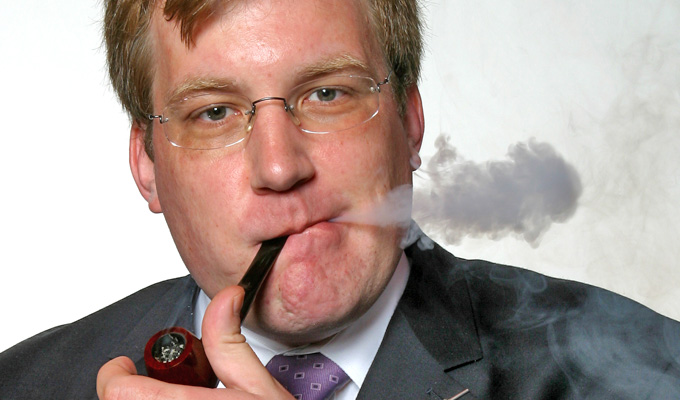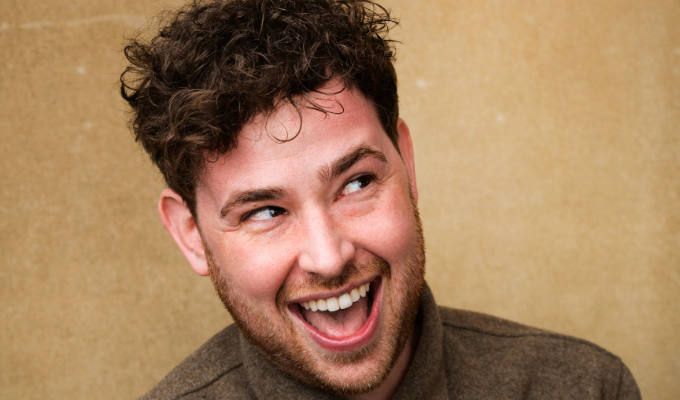
Twice As Nice Comedy
Note: This review is from 2014
Gig review by Steve Bennett in London
Promoter and compere Sam Deards has roped in his parents and some of their friends to bolster the audience at tonight’s Twice As Nice show, held above a West London pub. Yet still it remains relatively under-attended for what entertainment was on offer. Such is the lot of mid-level club gigs...
Andrew Watts opened in well-worn suit and hastily tied tie. It’s clear this fortysomething is not the alpha-male type, and his ineffectual masculinity and careworn demeanour define his act. He’s the bumbling, mild-mannered nice guy from lower-middle management who women always overlook.
Such a personality has its pitfalls for a comic, and Watts is unlikely to ever invigorate an audience with his charisma and energy. But what he lacks in pizzazz, he makes up for with sharply wry writing and a distinctively weary attitude. Even with ideas that risk being formulaic or even obvious, such as comparing his attitude to driving (cautious and resigned) with his attitude to sex, there’s usually a tagged-on punchline or skilful turn of phrase that gives the material a twist.
His suburban lassitude lends itself well to such subjects as being disengaged from the birth of his first child – a situation he describes by analogy with his beloved cricket. But Watts is also able to tackle big subjects such as racism and feminism from the point of view of a timorous man scared of doing the wrong thing. While the subject of necrophilia, which could be a shock-comic’s staple, is here reduced to the dry mundanity of legalese – a perfect summary of his whole approach.
After some hit-and-miss work in progress from Chris Martin, part two kicked off with George Colebrook, who needs to do more than talk conversationally about being a young, slightly awkward middle-class chap if he’s to stand out from every other comic with the same attributes. Axing the hack ‘hilarity’ than ensues when out-of-touch parents believe (as David Cameron once did) that LOL stands for ‘lots of love’ would be a start.
Yet he’s an amiable enough presence and there are better moments. His dim pal Barry, complete with Brummie accent, provides a decent source of wit, even if the routine he inspired that links Colebrook’s first name with that of Prince George is more than a little contrived in its set-up.
In contrast, Sarah Callaghan has a brassy Cockney swagger that is appealingly unaffected. It therefore jars when she tries to force a pun or other obvious joke into her set, especially as there’s a natural humour to her patter that she fosters well. As she holds forth about rows with her ‘geezer’, aversion to running, or peculiar turns of phrase she’s heard, the bubbling stream of opinionated certainties make for a refreshing ride.
There’s some sense that this promising 22-year-old has yet to iron our some of the rough edges to the writing – and if she can do that without sacrificing the charismatic rawness of the delivery, we’ll be hearing a lot more of her.
Yet another contrast next, as Ian Lane is really too aloof in delivery and too rarefied in material to connect with an audience. Pithy poems, setting an uncompleted sudoku grid to music or reducing a train announcement to a series of noises are certainly clever, but not always that funny. With a curtsey he pretty much begs for applause for his invention – and the audience dutifully respond – but there are very few spontaneous laughs from the heart here.
Strangeness rules in the third section, starting with upbeat young Scot Matt Winning, cheerily overselling gags that are rarely worth it. You can’t fault his commitment, but this is a difficult path to tread. Since the jokes need to be weird, cheesy or preferably both for his slightly unhinged persona to work, they can – as in this instance – prove merely baffling for those who witness it. There may be a special combination to unlock the full potential of his distinctive wit, but tonight the audience largely humoured Winning, although the occasional line landed very well.
Headliner Lou Sanders came across as similarly dotty, although more endearing in her scatty attempts to entertain with rough material that she’s still, apparently, working on.
Yet in adversity, she remains upbeat and self-effacing, providing a carefree commentary on her own failings that provides laughs even when her set-pieces, such as enacting out a small play, don’t. The spontaneity and lightness of touch are appealing, but how long she could sustain this for – in terms of the length of the set or the length of a career – without a more solid base is open to debate. The proof will be in the finished product.
Review date: 3 Jun 2014
Reviewed by: Steve Bennett
Reviewed at:
The Grove Hammersmith






